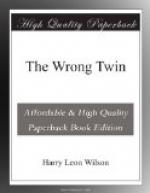They went up Fair Street to reach the wooded hills beyond the town. The street was still and vacant. The neat white houses with green blinds set back in their flowered yards would be at this hour sheltering people who had eaten heavily of chicken for dinner and now dozed away its benign effects. Even song birds had stilled their pipings, and made but brief flights through the sultry air.
Dave Cowan sauntered through the silence in a glow of genial tolerance for the small town, for Dave knew cities. In Newbern he was but a merry transient; indeed, in all those strange cities he went off to he was but a transient. So frequent his flittings, none could claim him for its own. He had the air of being in the world itself, but a transient, a cheerful and observant explorer finding entertainment in the manners and customs of a curious tribe, its foibles, conceits, and quaint standards of value—since the most of them curiously adhered to one spot even though the round earth invited them to wander.
Sometimes Dave lingered in Newbern—to the benefit of the Weekly Advance—for as long as three months. Sometimes he declared he would stay but a day and stayed long; sometimes he declared he would stay a long time and stayed but a day. He was a creature happily pliant to the rule of all his whims. He never bothered to know why he dropped into Newbern, nor bothered to know why he left. On some morning like other mornings, without plan, he would know he was going and go, stirred by some vagrant longing for a strange city—and it was so easy to go. He was unencumbered with belongings. He had no troublesome packing to do, and took not even the smallest of bags in his farings forth. Unlike the twins, Dave had no Sunday clothes. What clothes he had he wore, very sensibly, it seemed to him. He had but to go on and on, equipped with his union card and his printer’s steel rule, the sole machinery of his trade, and where he would linger he was welcome, for as long as he chose and at a wage ample for his few needs, to embalm the doings of a queer world in type. Little wonder he should always obey the wander-bidding.
They passed a place where the head of the clan, having dined, had been overtaken with lethargy and in a hammock on his porch was asleep in a public and noisy manner.
“Small-town stuff!” murmured Dave, amiably contemptuous.
The Wilbur twin could never understand why his father called Newbern a small town. They came to the end of Fair Street, where the white houses dwindled into open country. The road led away from the river and climbed the gentle slope of West Hill. The Wilbur twin had climbed that slope the day before under auspices that he now recalled with disgust. Beyond, at the top of the hill, its chimneys lifted above the trees and its red walls showing warmly through the cool green of its shading foliage, was the Whipple New Place. To the left, across the western end of the little town and capping another hill, was the Whipple Old Place, where dwelt Sharon Whipple and his daughter, Juliana. The walls of the Whipple Old Place were more weathered, of a duller red. The two places looked down upon the town quite as castles of old looked down upon their feudatories.




